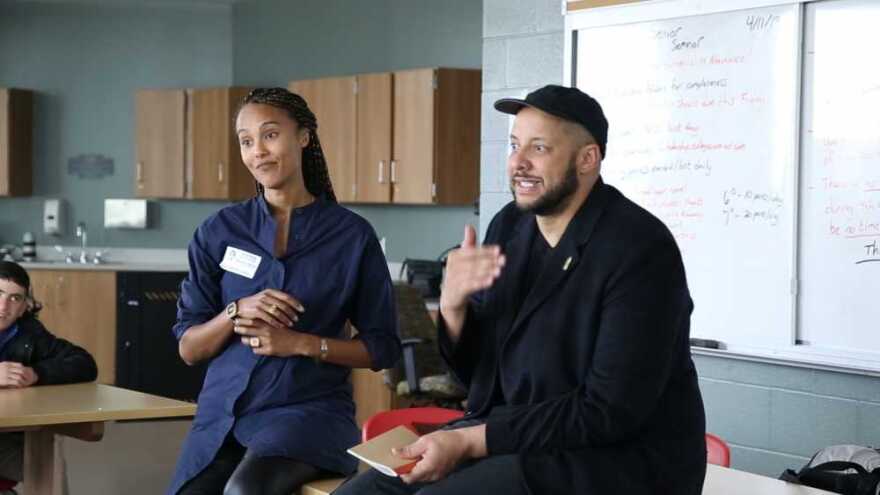In the past two decades, more than 7,600 refugees have settled in greater Cleveland. They come here seeking sanctuary from war, famine, or political conflict in their home countries.
The majority of newcomers arrived from Bhutan, Burma, Iraq, and Somalia. During this past school year, roughly 230 of those refugee teenagers attended Cleveland Metropolitan High Schools. These students face extra challenges beyond completing homework assignments or taking tests.
Some have not had any formal education and many have experienced trauma. A pilot program called The Teen Response at John Marshall High School aims to help these students to not only adjust to school but to American life.
Abdalsalam Alkhlif and his family have endured a lot in the last eight years. They left their home country of Syria in 2011, shortly after the civil war began. His daughter, Shahd was just seven years old.
Abdalsalam Alkhif and one of his sons at their home in Cleveland. [Jean-Marie Papoi / ideastream]
“We feel like it is not great to stay on in Syria,” she said. “We had to leave before someone died from my family.”
They spent several years as refugees in neighboring Jordan, where Shahd says, “my dad wanted to find a job, but he couldn't find a job. I went to school, but it is bad. The Jordan schools were bad, I learned nothing.”
When the family got the chance to move to the United States, they grabbed it. They spent two years in New Jersey where, at first, Shahd, who is Muslim and wears colorful hijabs, had trouble adjusting.
Shahd Alklif listening to Emma Vogel during the Teen Response program. [Jean-Marie Papoi / ideastream]
“It [was] hard. Sometimes I cried,” said Shahd. “How do you learn English? It is hard. I was in the seventh grade in middle school. I see people looking at me wondering, ‘Who is this?'”
About five months ago, Shahd and her family moved again, this time to Cleveland.
Shahd now attends John Marshall High School, where she is a ninth grader. She says she finally feels at home.
One helpful factor is the Teen Response after school program, which she attends two days a week. The pilot program started as a partnership between the Cleveland Metropolitan School District's Multilingual Multicultural Education Office and The Refugee Response, a nonprofit founded in 2009 dedicated to assisting families resettling in Northeast Ohio by helping them learn English and become self-sufficient.
The Refugee Response wanted to offers resources to high school students after years of focusing on families and adults, says Teen Response coordinator Emma Vogel.
“The Refugee Response just realized a gap in services to the teenage population and that's across the United States,” Vogel said. “These teenage refugees are a vulnerable population and so The Refugee Response decided to take action and do something about it.”
About 26 students from seven different countries including Syria, Somalia and The Democratic Republic of the Congo consider this program a safe space to share their stories and learn more about the United States.
Students attending the Teen Response after school program. [Jean-Marie Papoi / ideastream]
Each session is different thanks to Vogel. She coaches the students on things like dressing for job interviews and she helps with homework. She brings in speakers to expose the students to different career paths.
“Students who come here, depending on the amount of education that's available in their home country, have not been exposed to a lot of formal education,” Vogel said. “So we talk about why school matters. We talk about graduation requirements and the importance and the doors that a high school diploma opens are all just very essential to this program. And then we also want to support students as they're thinking about potential careers.”
During one session, New York-based director Kaneza Schaal and author-illustrator Christopher Myers came to gather research for their production, “ Cartography,” an interactive play commissioned by Playhouse Square to explore the issues of modern migration, highlighting the true stories of young people coming to the United States from El Salvador, Syria, Lebanon, South Africa and Rwanda.
Kaneza Schaal and Christoper Myers speaking to students attending the Teen Response program about their production “Cartography” coming to Playhouse Square in November. [Darrielle Snipes / ideastream]
Schaal and Myers are incorporating the stories they hear at Teen Response into their performance when they return to Playhouse Square’s Ohio Theater in November.
“These kids are some of the bravest kids you'll ever meet,” Myers said. “Many of these children have found a way to create themselves from desperate situations, from lives that have been torn asunder but have still found ways to be joyful, to be happy, to have hope.”
Shahd is one of those who have endured and thrives. She hopes to become a doctor and says the program has helped her inch closer to that dream. She adds Vogel gave her the encouragement she needs.
“Before, I cannot say my story to anyone or ask questions. Now I can,” Shahd said. “She [Vogel] makes me strong, she says, ‘You can do it’.”
For her part, Vogel says Shahd, along with many of her fellow teens in the program, has become more confident.
“I’ve seen the students become increasingly vulnerable and willing to share with one another,” Vogel said. “They are willing to support one another, offer each other advice about how to deal with negative comments that they might experience during the school day. They encourage each other to overcome the obstacles and challenges that they are facing whether it is outside of school, at home or in the community. They're just a great support to each other.”
The Teen Response program served 9th through 11th graders this past year. It will expand to include high school seniors in the next school year.


![Emma Vogel, Teen Response Coordinator is speaking with the students who participate in the after school program. [Jean-Marie Papoi / ideastream]](https://npr.brightspotcdn.com/dims4/default/4830315/2147483647/strip/true/crop/3000x1995+0+0/resize/880x585!/quality/90/?url=http%3A%2F%2Fnpr-brightspot.s3.amazonaws.com%2Flegacy%2Fuploads%2F2019%2F6%2F03%2FJMP_9481.JPG)




